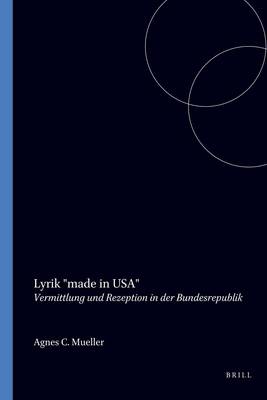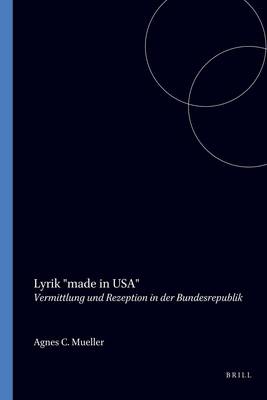
- Afhalen na 1 uur in een winkel met voorraad
- Gratis thuislevering in België vanaf € 30
- Ruim aanbod met 7 miljoen producten
- Afhalen na 1 uur in een winkel met voorraad
- Gratis thuislevering in België vanaf € 30
- Ruim aanbod met 7 miljoen producten
Zoeken
€ 140,45
+ 280 punten
Omschrijving
This is the first book to analyze fully the West German mediation and reception of American poetry following World War II. Contrary to expectations, it shows that, despite some serious and thoughtful attempts by German authors at mediating contemporary US-poetry to a West German audience shortly after the war, a broad reception was only successful in the late 1960s, concurrent with the student protests and the discovery in Germany of the beat generation. This development is surprising when compared to Germany's much earlier and enthusiastic reception of American prose, film, and mass culture.
The study explores some of the cultural, political, and literary reasons for the delay in poetry mediation and reception - especially in the reception of William Carlos Williams's poems. It describes how poets such as Robert Creeley, Charles Olson, Gregory Corso, Allen Ginsberg, Lawrence Ferlinghetti, and especially Frank O'Hara, Ted Berrigan, Anne Waldman, and John Giorno had and continue to have a significant impact on contemporary German writers and audiences following successful mediation in anthologies by Hans Magnus Enzensberger (1960), Walter Höllerer (1961), and especially Rolf Dieter Brinkmann (1968).
The book will be of interest to Germanists in both Germany and the US because it is the first study of an important but neglected aspect of German literary history between 1945 and 1989. Additionally, the author conducted interviews with significant figures of Germany's contemporary literary scene (Hans Magnus Enzensberger, Peter Hamm and Michael Krüger) which are transcribed and attached in the Appendix. This study will be equally important for scholars and students of Comparative Literature, since it not only deals with two national literatures, but is especially concerned with cross-literary and cross-cultural relations. Finally, the book should also be well received by scholars of American Studies both in Europe and in the US, since it adds significantly to our understanding of the USA in its global context.
The study explores some of the cultural, political, and literary reasons for the delay in poetry mediation and reception - especially in the reception of William Carlos Williams's poems. It describes how poets such as Robert Creeley, Charles Olson, Gregory Corso, Allen Ginsberg, Lawrence Ferlinghetti, and especially Frank O'Hara, Ted Berrigan, Anne Waldman, and John Giorno had and continue to have a significant impact on contemporary German writers and audiences following successful mediation in anthologies by Hans Magnus Enzensberger (1960), Walter Höllerer (1961), and especially Rolf Dieter Brinkmann (1968).
The book will be of interest to Germanists in both Germany and the US because it is the first study of an important but neglected aspect of German literary history between 1945 and 1989. Additionally, the author conducted interviews with significant figures of Germany's contemporary literary scene (Hans Magnus Enzensberger, Peter Hamm and Michael Krüger) which are transcribed and attached in the Appendix. This study will be equally important for scholars and students of Comparative Literature, since it not only deals with two national literatures, but is especially concerned with cross-literary and cross-cultural relations. Finally, the book should also be well received by scholars of American Studies both in Europe and in the US, since it adds significantly to our understanding of the USA in its global context.
Specificaties
Betrokkenen
- Auteur(s):
- Uitgeverij:
Inhoud
- Aantal bladzijden:
- 260
- Taal:
- Duits
- Reeks:
- Reeksnummer:
- nr. 36
Eigenschappen
- Productcode (EAN):
- 9789042004870
- Verschijningsdatum:
- 1/01/1999
- Uitvoering:
- Paperback
- Formaat:
- Trade paperback (VS)
- Afmetingen:
- 170 mm x 240 mm
- Gewicht:
- 571 g

Alleen bij Standaard Boekhandel
+ 280 punten op je klantenkaart van Standaard Boekhandel
Beoordelingen
We publiceren alleen reviews die voldoen aan de voorwaarden voor reviews. Bekijk onze voorwaarden voor reviews.











